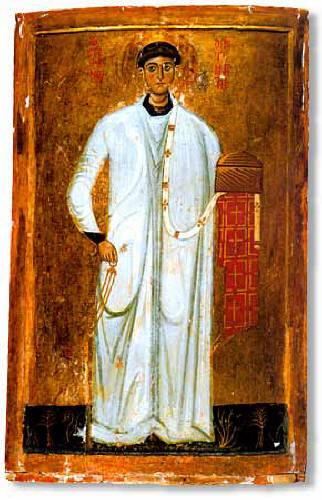St. Stephen’s Day is the last festive day over the ‘Christmas cycle’ of the year. It is marked on the third day after Christmas – December 27, when Orthodox Christianity honors the memory of St. Protomartyr and Archdeacon Stephen – the first Christian ever to choose the death of a martyr in the name of Jesus.
As the legend has it, St. Stephen was fully devoted to his service. He was among the first 7 deacons, initiated by the first apostles. He was a wonderworker – he  would put his hands on ill bodies and those would be healed in a miraculous manner. Seeing a gradually increasing number of people turning to Christianity the Jewish elders decided to do their best to prevent this. They vilified and set the crowd against Stephen, later on calling him to stand before the Sanhedrim court. Defending his faith he argued with the elders, blaming them for having murdered the Savior. His righteous words made them mad and Stephen was taken out of town and stoned to death. Through all of this time the archdeacon prayed to Christ to receive his soul. Even his last words were a prayer for the ones who tortured him: ‘Please, Lord, count this deed of theirs as no sin!’ A young man by the name of Saul of Tarsus was among the most fierce doers in the crowd. Later on the same person would become a devoted preacher of Christianity under the name of Apostle Paul. The legend says that Virgin Mary prayed for Stephen, watching his death as a martyr from a distance.
would put his hands on ill bodies and those would be healed in a miraculous manner. Seeing a gradually increasing number of people turning to Christianity the Jewish elders decided to do their best to prevent this. They vilified and set the crowd against Stephen, later on calling him to stand before the Sanhedrim court. Defending his faith he argued with the elders, blaming them for having murdered the Savior. His righteous words made them mad and Stephen was taken out of town and stoned to death. Through all of this time the archdeacon prayed to Christ to receive his soul. Even his last words were a prayer for the ones who tortured him: ‘Please, Lord, count this deed of theirs as no sin!’ A young man by the name of Saul of Tarsus was among the most fierce doers in the crowd. Later on the same person would become a devoted preacher of Christianity under the name of Apostle Paul. The legend says that Virgin Mary prayed for Stephen, watching his death as a martyr from a distance.
The temple fest of the Bulgarian St. Stephen /Iron/ Church in Istanbul is celebrated today. It is one of the greatest Bulgarian sanctuaries, related to the fight of the church for independence which began in the first decades of the 19th c. The people’s calendar celebrates St. Stephen’s Day as the name day of all those who carry the names Stefan, Stefana, Stefka, Venko, Stoyan, Stoyko, Stoichko, Stoimen… Meat dishes are placed on the table – pork with sauerkraut, banitsa /cheese pastry/ etc. Younger folks would visit their elderly relatives, best men, godparents etc.
English version: Zhivko Stanchev
On 20 April, all Christians will celebrate the Resurrection of Christ. Against the backdrop of our divided and troubled world, Catholics, together with Orthodox Christians, Armenians and Protestants, will send a message of hope and share the joy of the..
Holy Saturday services begin on Friday evening with Vespers. The Church commemorates the burial of Christ the Saviour and His descent into hell to save the righteous who had died before His work of redemption. Joseph of Arimathea and Nicodemus, with..
On Good Friday, the saddest day for Christians, the liturgy commemorates the suffering, crucifixion and death of Jesus Christ, who sacrificed himself for the guilt and sins of humanity. The service at the Metropolitan Cathedral "St. Nedelya" in..

+359 2 9336 661
